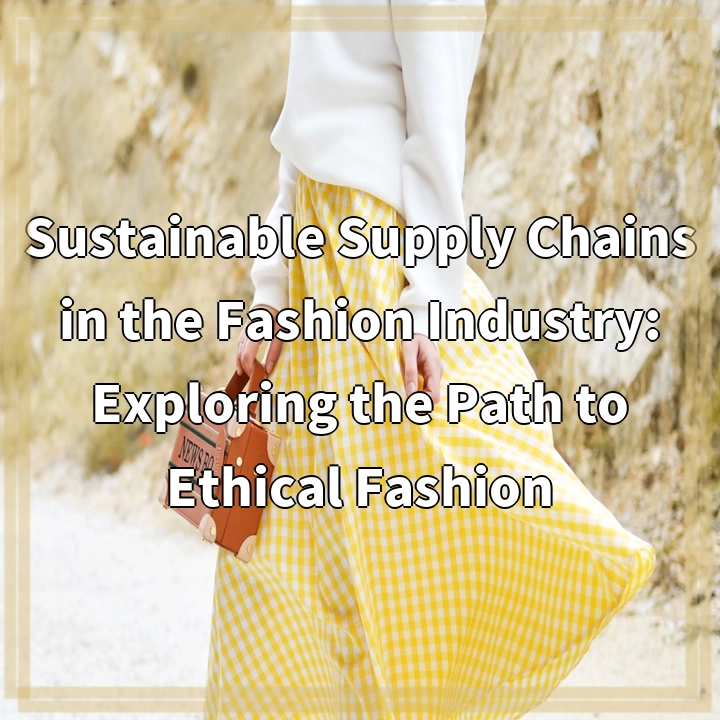Physical Address
304 North Cardinal St.
Dorchester Center, MA 02124
Physical Address
304 North Cardinal St.
Dorchester Center, MA 02124

Sustainable supply chains in the fashion industry refer to the implementation of environmentally, socially, and economically responsible practices throughout the production, distribution, and consumption processes of fashion products. It encompasses every stage of the supply chain, from sourcing raw materials to the end of the product life cycle. This approach aims to mitigate the negative impacts of the fashion industry, such as pollution, resource depletion, unethical labor practices, and waste generation.
Pollution and Environmental Degradation
The fashion industry is notorious for its contribution to pollution and environmental degradation. The production of textiles involves the use of harmful chemicals and excessive water consumption. Additionally, the disposal of textile waste in landfills leads to further environmental harm. Sustainable supply chains seek to address these issues by implementing cleaner production methods and promoting the use of eco-friendly materials.
Ethical Labor Practices
One of the major challenges in the fashion industry is the prevalence of unethical labor practices, such as sweatshops and child labor. Many clothing brands outsource their manufacturing to countries with lax labor regulations, leading to exploitation and poor working conditions for garment workers. Sustainable supply chains aim to ensure fair wages, safe working environments, and the protection of workers’ rights throughout the supply chain.
Supply Chain Transparency
Lack of transparency is a significant issue in the fashion industry. Consumers often have limited visibility into the processes and practices involved in producing their clothes. This makes it difficult for them to make informed choices and support sustainable brands. Sustainable supply chains prioritize transparency, providing consumers with detailed information about the materials used, production processes, and the social and environmental impacts associated with each product.
Waste Management
The fashion industry generates a vast amount of waste due to excessive production and the disposal of unwanted garments. Traditional linear supply chains contribute to this issue by encouraging a “take-make-dispose” approach. Sustainable supply chains emphasize circular economy principles, promoting recycling, upcycling, and the use of sustainable materials to reduce waste and create a closed-loop system.
Changing Consumer Behavior
Shifting consumer attitudes and behavior are significant challenges in transitioning to sustainable supply chains in the fashion industry. Many consumers are accustomed to fast fashion, which promotes frequent purchases of cheap and trendy clothing. However, education and awareness campaigns, along with the availability of sustainable alternatives, can help change consumer behavior and create a demand for ethical and sustainable fashion.
Adopting Eco-Friendly Production Methods
Implementing cleaner production methods can significantly reduce pollution and environmental degradation in the fashion industry. Brands can switch to organic or recycled materials, minimize chemical usage, and conserve water throughout the manufacturing process.
Ensuring Ethical Labor Practices
Brands should prioritize the fair treatment of workers and ensure safe working conditions. This involves partnering with suppliers that have strong labor practices, conducting regular audits, and promoting transparency within the supply chain.
Promoting Supply Chain Transparency
Increasing transparency helps consumers make informed choices and support sustainable brands. Fashion companies can enhance transparency by providing information about their sourcing practices, production processes, and the social and environmental impacts of their products.
Implementing Waste Reduction Strategies
Transitioning towards a circular economy model is crucial for reducing waste in the fashion industry. Brands can adopt strategies such as recycling programs, upcycling initiatives, and designing products with longevity and recyclability in mind.
Educating and Engaging Consumers
Education and awareness play a vital role in encouraging consumers to embrace sustainable fashion. Brands can engage with their customers through marketing campaigns, collaborations, and events to promote sustainable practices and communicate the benefits of ethical fashion choices.
Sustainable supply chains in the fashion industry aim to mitigate the negative impacts of the industry, such as pollution, unethical labor practices, and waste generation. By adopting eco-friendly production methods, ensuring ethical labor practices, promoting supply chain transparency, implementing waste reduction strategies, and educating consumers, the fashion industry can transition towards a more sustainable and ethical future.
If you’re wondering where the article came from!
#